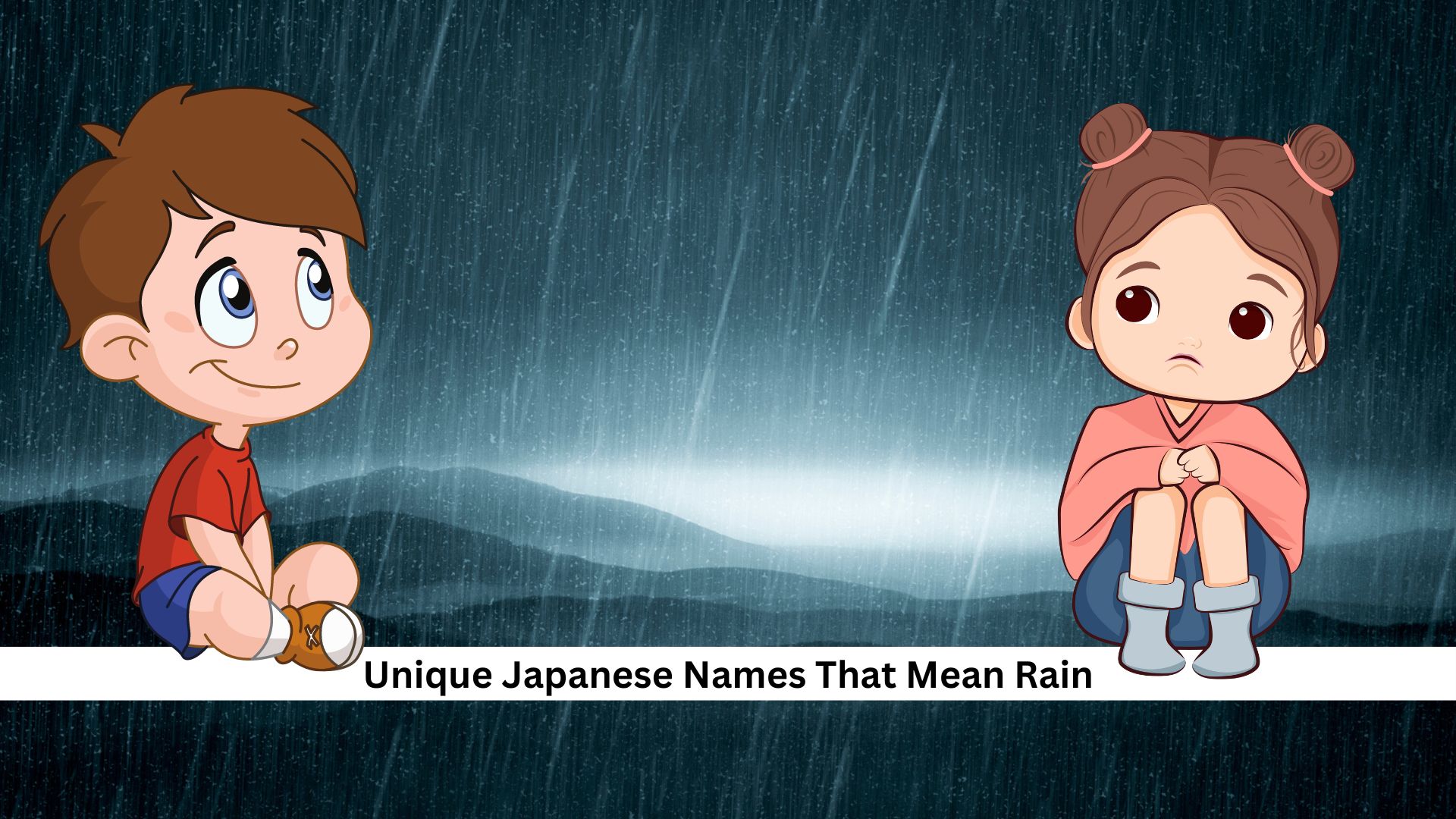Exploring Japanese culture through names that mean rain shows us how much they value nature and its fleeting beauty. These names, from the well-known ‘Ame’ to the less common ‘Hisame’, do more than identify someone. They connect deeply with cultural values and individual identities. As we go through this list of over 70 unique Japanese names, think about how they tell stories about the culture and maybe even find one that speaks to you personally.
Japanese Names For Girls That Mean Rain
Let’s dive deeper into the meaning of rain by looking at some beautiful Japanese girl names that capture this element. Take ‘Ame,’ which means ‘rain.’ This name reflects purity and how essential rain is for life. Then there’s ‘Amaya,’ meaning ‘night rain.’ It captures the quiet, fleeting nature of rain, adding a touch of mystery. These names not only tie the bearers to nature but also carry meanings of growth, renewal, and the kind of quiet reflection we often find on rainy days.
- Amaya (雨夜) – “Night rain” because the name directly translates to the poetic imagery of rain falling at night.
- Umi (海) – “Sea” since the sea is often associated with rain and its cycles.
- Mizuki (水月) – “Beautiful moon” or “water moon,” symbolizing the reflection of the moon in water, often seen during rainy nights.
- Sora (空) – “Sky” where rain originates.
- Shizuku (雫) – “Droplet” like a single drop of rain.
- Rina (莉奈) – “Jasmine,” a flower that blooms during the rainy season.
- Nagi (凪) – “Calm” as in the peaceful calm after a rainstorm.
- Ran (蘭) – “Orchid,” a flower that thrives in a humid, rainy environment.
- Uzuki (卯月) – “Month of rain,” traditionally known as a rainy month in Japan.
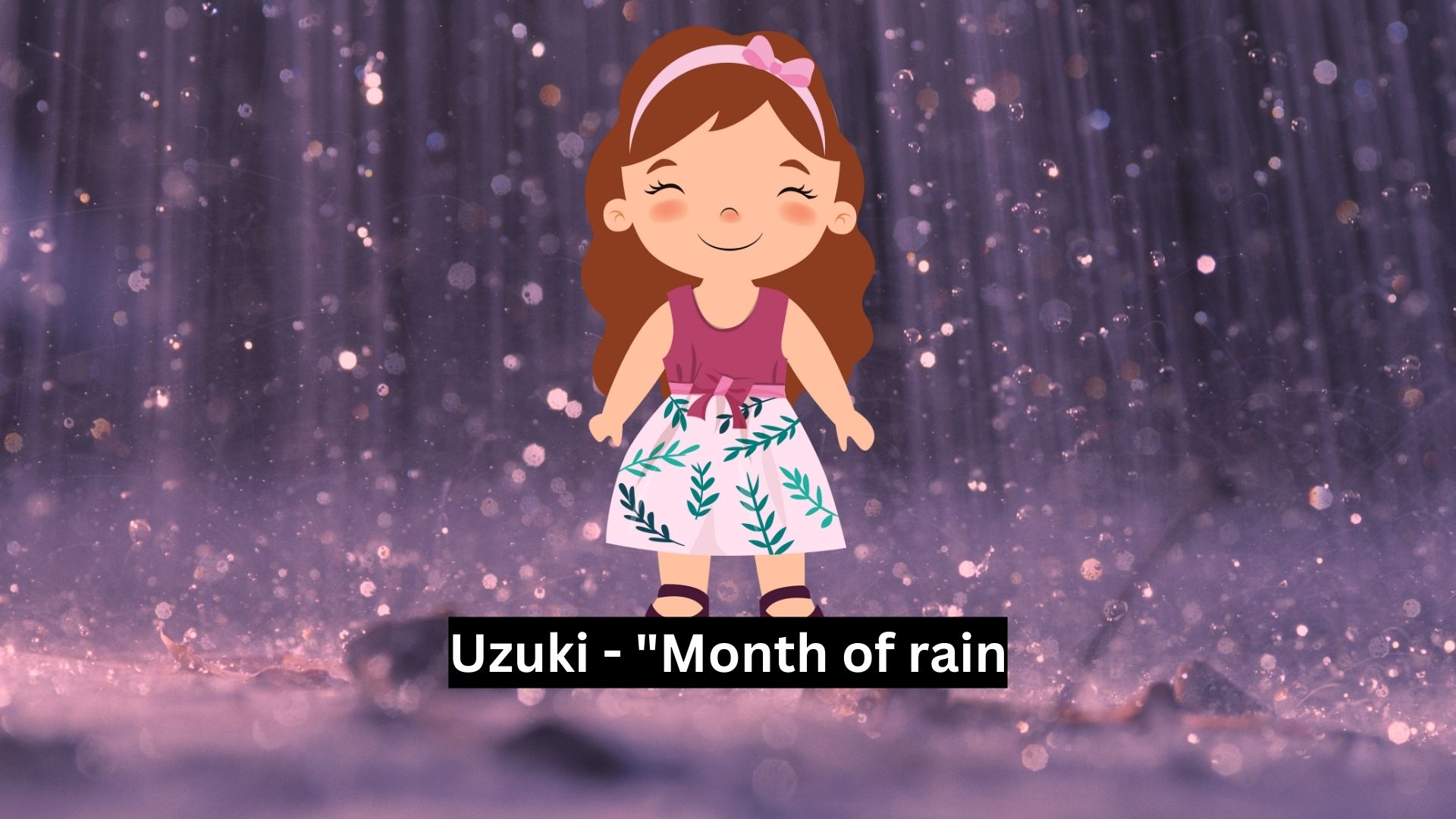
- Chihiro (千尋) – “Thousand fathoms,” representing the deepness of water.
- Sayuri (小百合) – “Small lily,” a flower that often grows in wet environments.
- Minako (美奈子) – “Beautiful child,” can be written with characters that mean “water.”
- Shinobu (忍) – “Endurance,” akin to enduring through a rainy day.
- Mio (美桜) – “Beautiful cherry,” cherries ripen during the rainy season.
- Nanami (七海) – “Seven seas,” alluding to the vast expanse of water.
- Satsuki (皐月) – “Fifth month,” which is traditionally a rainy month in Japan.
- Akina (秋菜) – “Spring flower,” as spring is often rainy.
- Haruka (遥) – “Far off,” like distant rain clouds.
- Kumiko (久美子) – “Eternal beautiful child,” can use the character for “cloud.”
- Michiko (美智子) – “Beautiful wisdom,” can use the character for “path,” like a path made wet by rain.
- Natsuko (夏子) – “Summer child,” summer in Japan includes the rainy season.
- Rin (凛) – “Cold,” like the chill of a cold rain.
- Suzume (雀) – “Sparrow,” a bird often seen after rain.
- Tatsuki (辰樹) – “Tree of the Dragon,” dragons in mythology are associated with rain.
- Urara (麗) – “Beauty” or “clear,” reminiscent of clear raindrops.
- Wakana (和奏) – “Harmonious,” like the soothing sound of rainfall.
- Yuina (結菜) – “Tie together,” like raindrops joining together.
- Zumi (住美) – “Dwelling,” representing a shelter from the rain.
- Hotaru (蛍) – “Firefly,” often seen on warm, humid nights after rain.
- Izumi (泉) – “Spring” or “fountain,” both sources of water.
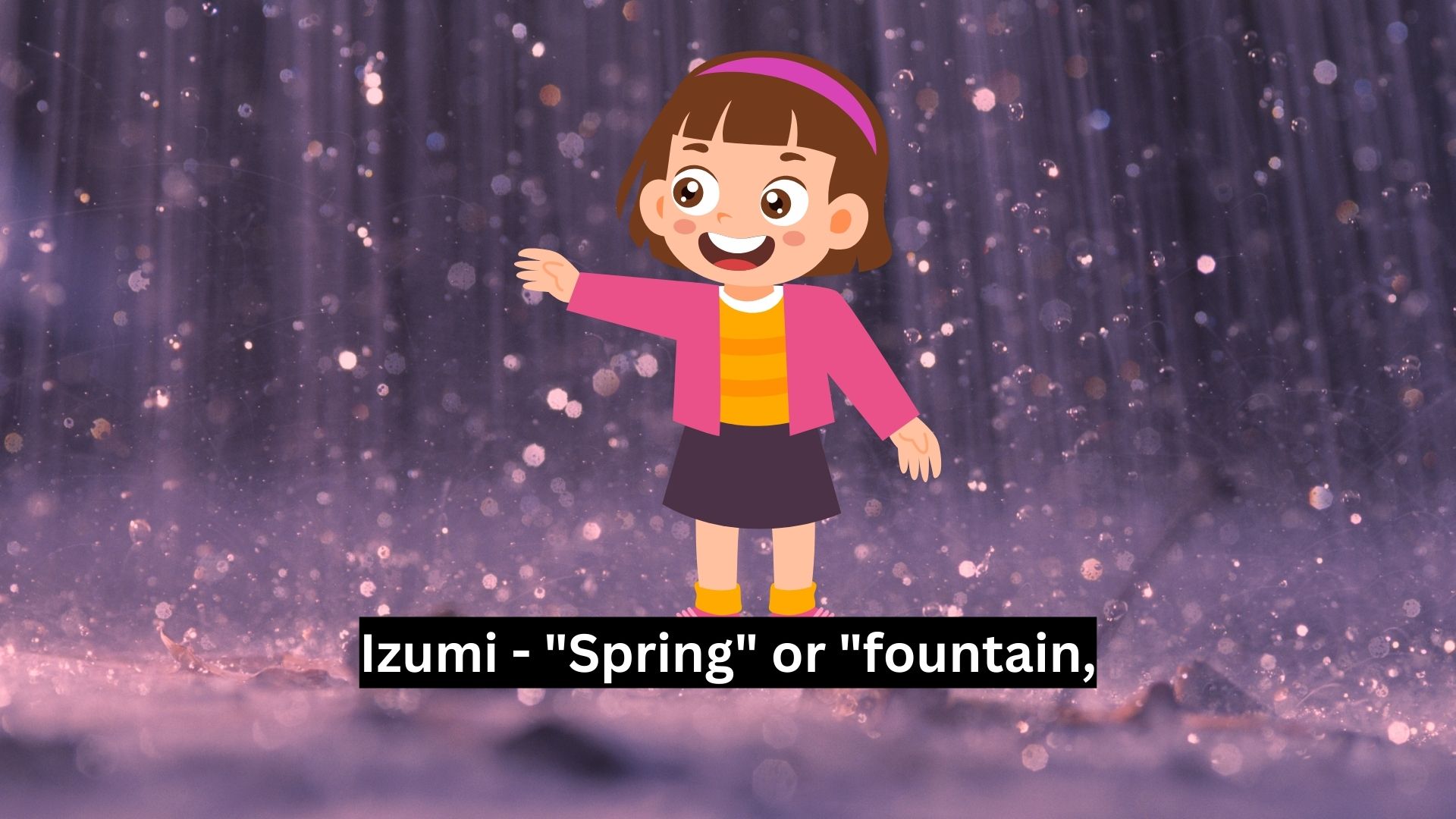
- Junko (純子) – “Pure child,” as rain is often seen as purifying.
- Kaori (香織) – “Fragrance,” like the fresh scent after rain.
- Misaki (美咲) – “Beautiful blossom,” referring to flowers that bloom during the rainy season.
- Nozomi (希) – “Hope,” like hoping for rain during a drought.
- Oki (沖) – “Ocean-dwelling,” with rain ultimately feeding into the ocean.
- Rei (鈴) – “Bell,” evoking the gentle sound of raindrops.
- Suzu (鈴) – “Tin bell,” another name mimicking the sound of rain.
- Tsuyu (梅雨) – “Rainy season,” directly referring to Japan’s rainy season.
Also Read: 80+ Japanese Names That Mean Dark And Their Hidden Meanings
Japanese Names For Boy That Mean Rain
Exploring Japanese boy names related to rain uncovers meanings that tie back to nature and feelings. These names are not just beautiful words; they show deep respect for rain in Japanese culture, where it’s seen as something that brings life and represents passing beauty. These names do more than identify someone; they connect him to nature’s rhythms and the deep thoughts that rain stirs in Japanese culture.
- Ame (雨) – Directly means “rain,” no further explanation needed.
- Amedeo (雨祝) – “Rain’s blessing,” suggesting rain as a beneficial gift.
- Amefuri (雨降り) – “Rainfall,” another direct reference to rain.
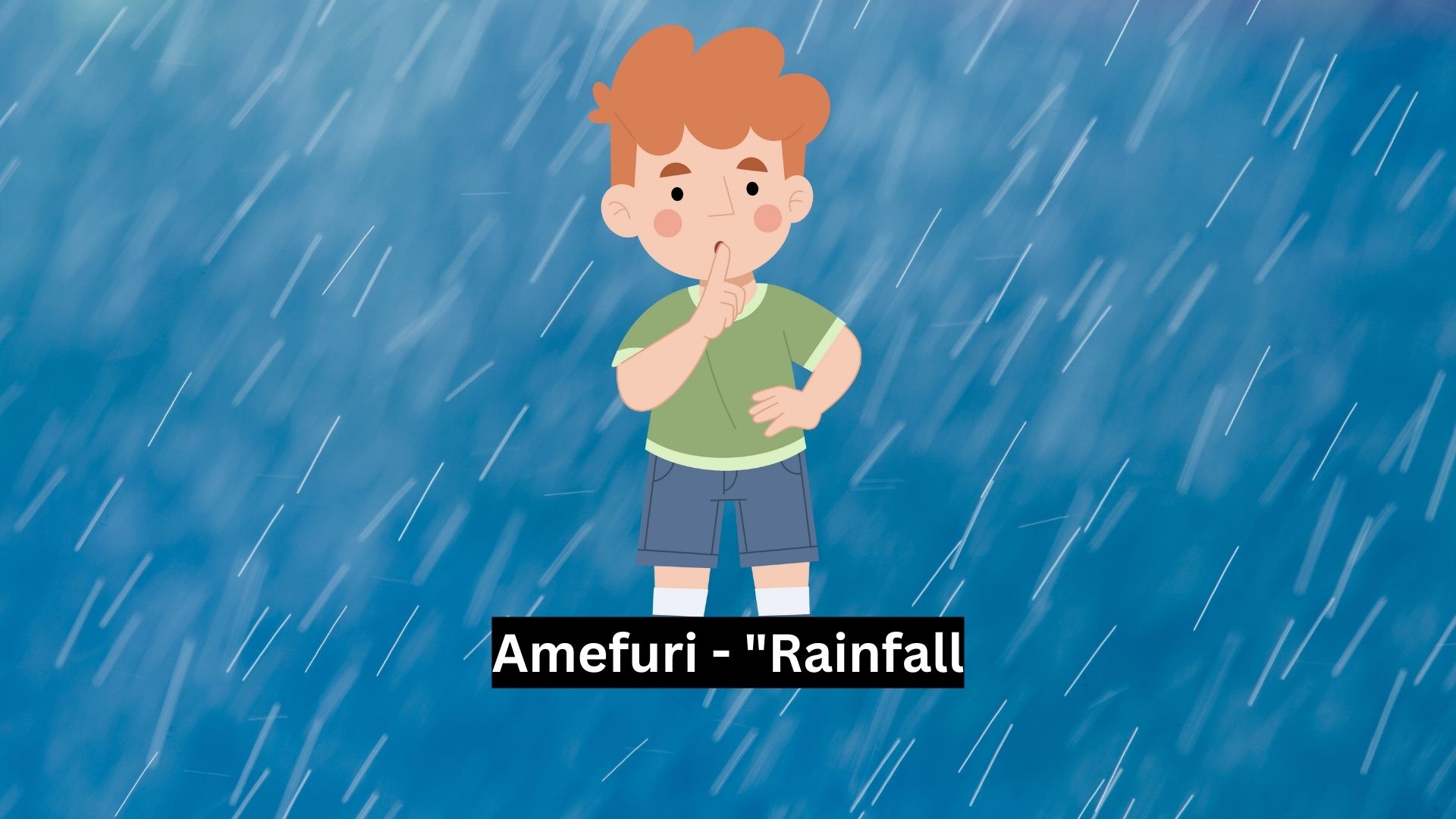
- Umi (海) – “Sea,” as rain ultimately ends up in the sea.
- Mizuki (水木) – “Water tree” or “moon water,” emphasizing water elements often connected to rain.
- Sorato (空人) – “Sky person,” since rain comes from the sky.
- Shigure (時雨) – “Autumn rain,” specifically referring to rain in the autumn season.
- Rin (凛) – Can mean “cold,” like the chill of a cold rain.
- Kaito (海斗) – “Sea, ocean,” both related to water.
- Hiroshi (広志) – “Generous,” can use the character for “water.”
- Takeshi (武士) – “Fierce, violent,” like the intensity of a rainstorm.
- Ryuu (竜) – “Dragon,” dragons are associated with rain in Japanese mythology.
- Minoru (実) – “Truth,” can use the character for “water.”
- Yuki (雪) – While it usually means “snow,” it can also relate to precipitation.
- Sora (空) – “Sky,” the origin of rain.
- Isamu (勇) – “Courage,” like facing a storm.
- Haruto (陽斗) – “Sun, flying,” representing the sun that comes after rain.
- Kouki (光季) – “Rain season,” directly referring to the rainy season.
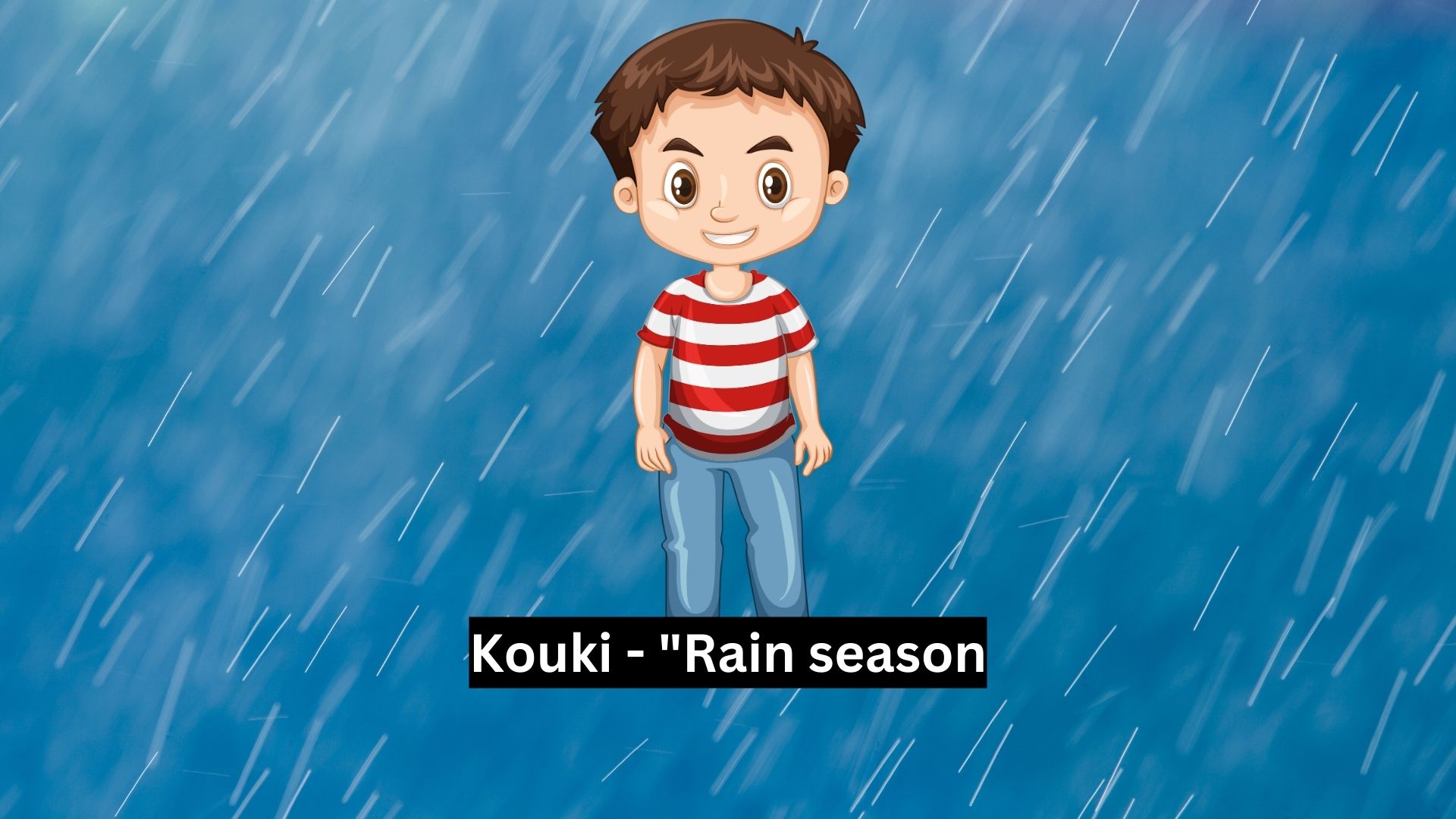
- Aoi (青) – “Blue,” like the color of rain-filled skies.
- Daichi (大地) – “Great land,” which is nourished by rain.
- Hayate (疾風) – “Smooth” or “swift wind,” often felt before rain.
- Ichirou (一郎) – “First son,” can use the character for “one drop.”
- Jun (潤) – “Moisture,” directly related to rain.
- Katashi (堅) – “Firmness,” like standing firm in the rain.
- Mamoru (守) – “Protect,” like sheltering from rain.
- Naoki (直樹) – “Straight tree,” standing tall in the rain.
- Osamu (治) – “Discipline,” like the steady discipline of rainfall.
- Ren (蓮) – “Water lily,” which grows in wet environments.
- Satoshi (聡) – “Clear-thinking, quick-witted,” can use the character for “village,” implying a community weathering storms.
- Takumi (巧海) – “Artisan,” can use the character for “sea.”
- Yuudai (雄大) – “Great hero,” like overcoming storms.
- Zenshi (善士) – “Virtuous samurai,” standing strong like a warrior in the rain.
- Hideaki (秀明) – “Excellent brightness,” like the sun after rain.
- Kazuo (和夫) – “Harmonious man,” in harmony with nature’s cycles, including rain.
- Makoto (誠) – “Sincerity,” as pure as rain.
- Noboru (昇) – “Ascend,” like rising mist after rain.
- Riku (陸) – “Land,” which is nourished by rain.
- Tatsuo (竜雄) – “Dragon man,” dragons are associated with rain.
Also Read: 100+ Japanese Names That Mean Love And Their Meanings
Conclusion
In conclusion, Japanese names that mean rain are deeply meaningful and beautiful. They capture both the look and feel of rain and connect people to nature and Japanese culture. Choosing a rain-related name can show a deep appreciation for rain’s importance in life, farming, and art. These names are great for anyone, from babies to fictional characters, offering meaningful choices for all genders. Each name tells a unique story and ties the person to the natural world’s ongoing beauty. Keep visiting The Jeep Diva for more such articles.

Fahmea Shorok is a well-traveled writer who focuses on entertainment journalism. Her work reflects her journeys and showcases her flexible writing style. She explores local art scenes wherever she goes, giving her readers a close look at the entertainment found around the world in theaters, movies, and art galleries.

